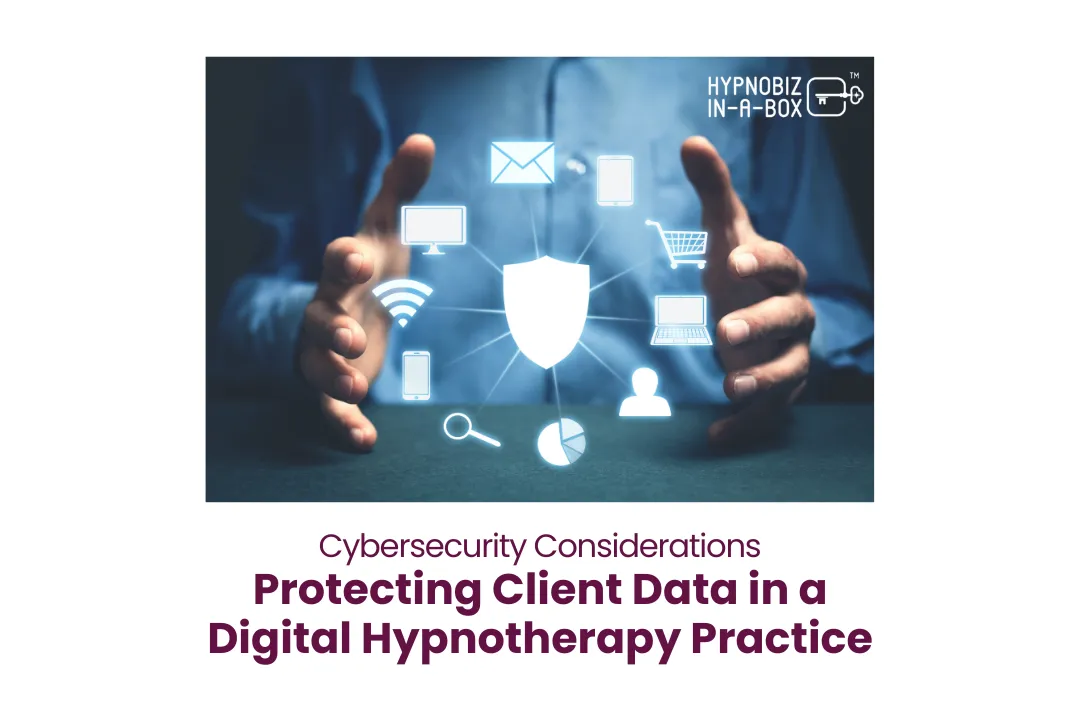HypnoBiz-in-a-Box™ Blog

Protecting Client Data: Technology for Hypnotherapists
Cybersecurity Considerations: Protecting Client Data in a Digital Hypnotherapy Practice
In today's interconnected world, where digital technologies permeate every aspect of our lives, protecting sensitive data has become paramount for businesses and professionals across various industries. The need for robust cybersecurity measures is particularly acute within hypnotherapy, where practitioners often deal with highly personal and confidential client information. As practitioners strive to leverage Technology for Hypnotherapists to enhance their services and streamline their operations, they must also be vigilant in safeguarding client data from potential cyber threats. Recognizing the gravity of this challenge, There are comprehensive solutions tailored to the unique needs of hypnotherapy practitioners, empowering them to protect their clients' privacy and uphold the highest standards of confidentiality.
Understanding the Risks
The digital landscape presents a myriad of risks and vulnerabilities that can compromise the security of client data. From sophisticated cyber attacks to human error, hypnotherapy practices are exposed to various threats that require careful consideration and proactive measures to mitigate.
Common risks include:
Data breaches: Unauthorized access to sensitive client information, resulting in potential harm or exploitation.
Malware infections: The infiltration of malicious software designed to disrupt operations or steal sensitive data.
Phishing scams: Deceptive attempts to trick individuals into divulging confidential information, such as login credentials or financial details.
Ransomware attacks: Malicious software that encrypts data and demands payment for its release, posing a significant threat to data integrity and availability.
Importance of Cybersecurity in Hypnotherapy
The importance of cybersecurity in hypnotherapy cannot be overstated, as it directly impacts the trust and confidence of clients, the practitioner's reputation, and the profession's overall integrity.
Key reasons why cybersecurity is essential for hypnotherapy practices include:
Client confidentiality: Hypnotherapy sessions often involve disclosing highly personal and sensitive information, which must be safeguarded against unauthorized access or disclosure.
Legal compliance: Practitioners are subject to various laws and regulations governing the protection of client data, such as the Health Insurance Portability and Accountability Act (HIPAA) in the United States. Failure to comply with these regulations can result in severe penalties and legal consequences.
Business reputation: A breach of client confidentiality can have devastating consequences for the reputation and credibility of a hypnotherapy practice, leading to a loss of trust and potential damage to future business opportunities.
Cybersecurity Measures for Hypnotherapists
There is a comprehensive suite of cybersecurity measures designed to address the unique challenges faced by hypnotherapy practitioners.
These measures include:
Secure data storage: Utilize encrypted storage solutions to protect client data from unauthorized access or tampering.
Strong authentication: Implement multi-factor authentication to ensure only authorized individuals can access sensitive information.
Regular software updates: Keep software and systems up-to-date to patch security vulnerabilities and protect against emerging threats.
Training and Education
In addition to providing robust cybersecurity tools and solutions, there should be extensive training and education resources to help practitioners stay informed about the latest developments in cybersecurity and best practices for protecting client data.
These resources include:
Online courses: Access comprehensive courses on cybersecurity tailored to the needs of hypnotherapy practitioners, covering topics such as threat detection, incident response, and data encryption.
Webinars: Participate in live webinars hosted by cybersecurity experts to learn about emerging threats, mitigation strategies, and practical tips for securing client data.
Knowledge base: Explore an extensive knowledge base filled with articles, guides, and tutorials on cybersecurity topics relevant to hypnotherapy practices, providing valuable insights and practical advice for practitioners.
Incident Response Planning
Despite the best efforts to prevent security incidents, hypnotherapy practices need to have robust incident response plans in place to minimize the impact of any breaches that may occur.
Key components of an effective incident response plan include:
Incident detection: Implement monitoring tools and procedures to detect security incidents immediately, enabling prompt response and mitigation efforts.
Response protocols: Define clear procedures for responding to security breaches, including notification of affected parties, containment of the breach, and restoration of affected systems.
Remediation efforts: Take swift action to remediate the effects of security breaches, such as restoring data from backups, patching vulnerabilities, and implementing additional security measures to prevent future incidents.
Conclusion
In conclusion, cybersecurity is a technology for Hypnotherapists that should be taken into consideration for hypnotherapy practices seeking to protect client data and uphold the highest standards of confidentiality and trust. By implementing robust cybersecurity measures, practitioners can safeguard sensitive information, mitigate potential risks, and ensure the integrity of their practice. Do not wait until it is too late - take proactive steps to secure your practice and protect your clients' privacy today.
FAQs
What cybersecurity regulations apply to hypnotherapy practices?
HIPAA regulations protect health information in the United States, including data collected during hypnotherapy sessions.
How often should I update my cybersecurity measures?
Regular updates are essential to stay ahead of emerging threats. Aim to review and update your cybersecurity measures at least annually.
What should I do if I suspect a security breach in my practice?
Act quickly to contain the breach, notify affected parties, and seek assistance from cybersecurity professionals to mitigate the damage.
Can I use cloud storage to store client data securely?
Many cloud storage providers offer encryption and other security features to protect sensitive data. However, choosing a reputable provider and implementing additional security measures as needed is essential.
How can I stay informed about the latest cybersecurity threats and best practices?
Subscribe to newsletters, follow reputable cybersecurity blogs, and participate in training courses and webinars to stay up-to-date on cybersecurity trends and techniques.

